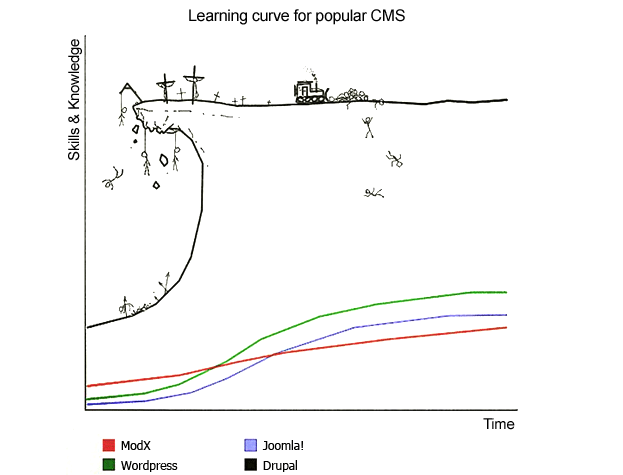I confess that I have always been in love with Drupal. But I have ended up surrendering to the simplicity of WordPress.
The prevailing idea is that Drupal is used for large-scale projects and WordPress for every kind of project. But if they are simple—like a personal blog, a business website, a small store, etc.—it’s better to use WordPress.
If you don’t know Drupal in depth, find out what it is
WordPress is something anyone can install, configure and use. With enough plugins we can give it all sorts of features, turning it into anything from an e-commerce site to an LMS or a static site. Drupal, on the other hand, can feel dizzying to a first-time webmaster.
There’s a cartoon that illustrates this very well.

Let’s look at the differences between the two CMSs in more detail, and at the end I’ll give you my personal opinion. These evaluations are aimed at “normal” users—people who just want a website. Development or design topics, which usually belong to professionals, aren’t considered here. That’s another league.
Drupal 7 vs Drupal 8 vs WordPress
Simply downloading the packages from their official sites shows that something is going on.
Drupal 8 (compressed) weighs 31 MB, compared with 3.9 MB for Drupal 7 and 13.9 MB for WordPress.
The Drupal 8 package is more than twice the size of WordPress, and once installed we end up with a
Flexibility and robustness
For me, this is Drupal’s greatest strength and the reason I feel so at home with it. In Drupal, everything fits together like a giant puzzle: any module you install to add functionality integrates with the rest of the system.
With WordPress you can do almost anything without writing code—there are excellent plugins—but each one works on its own.
A simple user-permission system isn’t solved in WordPress. Add a forum plugin and you can’t fully manage user permissions—or not all of them.
If you add a new content type, not every plugin (say, your ad-management or SEO plugins) will work with it. Then you have to dive into code, and it’s frustrating: things run separately, but you know they don’t mesh.
For example, if I want to build an LMS with a forum, in WordPress…
In Drupal, out of the box you can:
- Create as many content types as you want (in WP you only get post and page)
- Create as many taxonomies as you want (in WP you only get category and tag)
- Create roles and manage user permissions
- Create a forum
And, with Panels and Views, you can click-together any landing-page layout you can imagine with dynamic content—something like the blocks WordPress has started adding with Gutenberg, but far more powerful. It deserves a video.
Design
Another point in favor of WordPress if you’re not a designer (I’m not talking front-end specialists).
Although Drupal has many free themes—some very good ones—and I’ve even seen commercial Drupal themes on Envato, WordPress offers practically limitless themes of every kind and for every taste.
Creating a child theme in WordPress and tweaking it to your liking is super simple, whereas in Drupal it’s much more complex.
There are truly beautiful Drupal projects, but they usually come from developers and are fully custom. I’ll go further: Drupal has so many options and possibilities that, if you buy a theme, it’s often complicated to make it look like the demo.
Maintenance
By maintenance I mean core updates for the CMS and updates for any plugins/modules and themes you have installed.
Here, the clear winner, no doubt, is WordPress. The ease of installing and updating anything in WordPress—and its reliability—are enviable. I think I’ve only ever had update issues once, and I use WP heavily. With Drupal, on the other hand, I’d make a backup, cross myself, and then start the update.
That’s a very, very, very big barrier for people who want to keep small projects going.
SEO
WordPress is “the paradise of SEO,” and that says it all. You can optimize any aspect: speed, URLs, redirects, meta tags, titles, structured data, reviews—there’s always a plugin for it.
There’s a huge WordPress ecosystem focused on SEO and ranking sites in Google, and it shows.

Comments